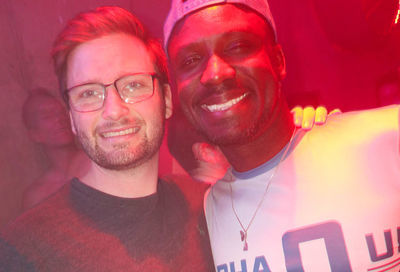Survey: Half of all LGBTQ Americans remain closeted in their workplace
Nominal acceptance of LGBTQ people is high, but 59% of heterosexuals say it's "unprofessional" to mention LGBTQ identity at work

A new survey from the Human Rights Campaign Foundation finds that little has changed in the past decade in terms of how “out” LGBTQ Americans are in the workplace.
According to the survey, about 46%, or nearly half, of LGBTQ workers say they are closeted at work, compared to 50% in a similar HRC report in 2008. When asked why they were not out, top reasons included the fear of being stereotyped, concerns over making people feel uncomfortable, concerns over losing connections or relationships with co-workers, and the fear that heterosexual co-workers will believe the LGBTQ co-worker is attracted to them.
The survey polled both LGBTQ and non-LGBTQ workers about their attitudes towards LGBTQ inclusion, as well a corporate policies and practices that either hinder or assist LGBTQ people from being out at work. Unfortunately, it also found there are significant barriers, including the internal biases of some co-workers, that prevent workplaces from being fully inclusive.
For example, the survey finds that 1 in 5 LGBTQ workers reports having been told or had co-workers imply that they should dress in a more feminine or masculine manner, in accordance with societal gender norms and stereotypes. Comparatively, only 1 in 24 non-LGBTQ workers reported being criticized about their wardrobe because it was not “masculine” or “feminine” enough.
While, broadly speaking, there is wide social acceptance for the LGBTQ community, in the workplace, subtle biases remain. For instance, 78% of non-LGBTQ workers say that they are comfortable talking about their spouse, partner, or dating to co-workers (compared to 73% of LGBTQ-identifying respondents). However, 25% of LGBTQ employees report that co-workers seem uncomfortable once they say something related to their sexual orientation or gender identity, even if it’s as simple as mentioning a partner or spouse.
Delving further into this topic, a much larger 36% of non-LGBTQ employees say they would feel uncomfortable hearing an LGBTQ colleague talk about dating, and 59% of that same group feel it is “unprofessional” to talk about sexual orientation or gender identity in the workplace — even though just by acknowledging a spouse or talking about their family life, as their heterosexual counterparts regularly do, involuntarily “outs” LGBTQ people.
About 18% of LGBTQ workers have reported that someone at their job has made sexually inappropriate comments to them because their co-worker thought their sexual orientation or gender identity made it okay. And 53% of LGBTQ workers report hearing jokes about lesbian or gay people (with 41% hearing transgender-specific and 37% bisexual-specific jokes) from their co-workers. But when those same heterosexual co-workers are asked, only 37% report hearing jokes about gays and lesbians.
Approximately 1 in 3, or 31%, of LGBTQ workers report feeling unhappy or depressed at work. Nearly one-quarter reported that they specifically avoid interacting with certain co-workers, when possible, at work, while 1 in 5 avoid special office get-togethers or stay home due to lack of acceptance. 17% of LGBTQ workers report feeling “exhausted” hiding their sexual orientation, and 13% say the same about hiding their gender identity.
Finally, the top reason LGBTQ workers fail to report negative comments they hear about LGBTQ people to a supervisor or human resources is they don’t think anything will be done to remedy the situation, and they don’t want to hurt their relationships with co-workers. A shockingly high 45% said they agreed that enforcement of a pro-LGBTQ workplace nondiscrimination policy depends entirely on their supervisor’s personal feelings towards LGBTQ people. And 13% said they believe they would be fired if their employer discovered they were LGBTQ.
“While LGBTQ-inclusive corporate policies are becoming the norm, LGBTQ workers too often face a climate of bias in their workplace,” Deena Fidas, the director of HRC’s Workplace Equality Program, said in a statement.
“LGBTQ employees are still avoiding making personal and professional connections at work because they fear coming out — and that hurts not only that employee, but the company as a whole. Even the best-of-the-best private sector employers with top-rated policies and practices must do more to nurture a climate of inclusion for all.”
Support Metro Weekly’s Journalism
These are challenging times for news organizations. And yet it’s crucial we stay active and provide vital resources and information to both our local readers and the world. So won’t you please take a moment and consider supporting Metro Weekly with a membership? For as little as $5 a month, you can help ensure Metro Weekly magazine and MetroWeekly.com remain free, viable resources as we provide the best, most diverse, culturally-resonant LGBTQ coverage in both the D.C. region and around the world. Memberships come with exclusive perks and discounts, your own personal digital delivery of each week’s magazine (and an archive), access to our Member's Lounge when it launches this fall, and exclusive members-only items like Metro Weekly Membership Mugs and Tote Bags! Check out all our membership levels here and please join us today!



























You must be logged in to post a comment.